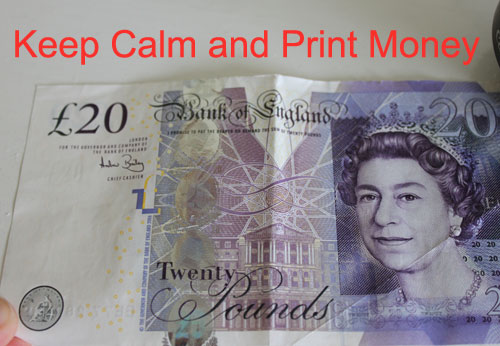Readers question: What happens to the underlying money (supply) if someone destroys currency rather than saving it or spending it?
The money supply is the total stock of notes, coins and bank deposits in the economy.
If money is destroyed (taken out of circulation) and not put back in by the Central Bank, then the overall money supply in the economy will fall. There will be less money circulating. Prices will tend to fall, and the value of the remaining money increase.
If the money supply is reduced how does that affect the economy?
If the money supply falls, it is likely to cause deflation (falling prices) or at least reduce the inflation rate.
It is the opposite of printing more money. If you print more money, it doesn’t change the output of an economy, it just creates more money and so puts upward pressure on prices. See: The problem of printing money
If the money supply falls, that doesn’t directly affect output. The amount of goods and services in the economy is not directly affected by people destroying or creating money But, with less money circulating, there is downward pressure on the price of the same number of goods.
Suppose in an economy, you have 10,000 goods and a money supply of £10 million. Then the average price of those goods will be £1,000.
- If the money supply falls to £8 million, the average price of those 10,000 goods will be now £800. You still enjoy the same number of goods, it’s just that the goods will be cheaper.
- After the fall in prices, the nominal GDP is lower. But, because prices are cheaper, people are still able to enjoy the same number of goods and services as before.
- It is the opposite of inflation. With inflation, we see a rise in nominal GDP. But, because prices go up, the amount of goods and services you enjoy remains the same.
Effect of deflation in the real world
In theory, reducing the money supply shouldn’t have any effect on real incomes or real output. However, in a situation where the money supply is falling, it could cause a fall in aggregate demand and lower economic growth.
If consumers notice a fall in the money supply (e.g. through lower nominal wages) they may lose confidence and because they fear lower incomes or unemployment start saving a higher percentage of their income.
Even falling prices can have the effect of reducing spending:
- If prices are falling, consumers are more likely to delay purchasing them – until they are cheaper. This causes a lower aggregate demand.
- If prices and wages are falling, the real value of debt increases. It becomes harder to pay old debts back with falling wages, therefore this also causes lower economic growth.
- see more at: Problems of deflation
In recent years, deflation or very low inflation has created significant economic problems in both Japan and the Eurozone.
Related


“Suppose in an economy, you have a 10,000 goods and a money supply of £10 million. Then the average price of those goods will be £1,000.” That’s an interesting inference. Could you explain it?
10 million divided by 10,000 = 1000. In other words, the average.
I suppose that the goods listed are those that were bought or sold in a period of time and that the money supply is the amount of cash that has been moved during that period as a result.
But then I think you must factor in the effect of interest rates as well. They are talking negative rates in some countries at present. This will probably have the effect of people hoarding money, not placing it with financial institutions, keeping it at home, deposit boxes, whatever.
So a whole lot less currency in circulation will force Mints to print more, resulting in an inflationary trend, thus spurring increased interest rates.